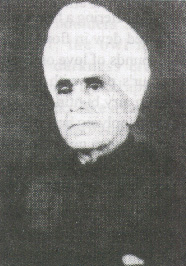Shri Maheshwar Nath Dhar
The First Royal Artist of Kashmir
By Krishna Dhar
It was dark-cold January,
the sun so pale and silent had set in horizon. The street oil lamps were
lit, flakes of snow began falling. It was the first snowfall of the year
1888 AD and the auspicious hour dawned the birth of a babe destined to
play a memorable role in the annals of paintings, art, portraits and photography.

Maheshwar Nath Dhar
The strange coincidence that marvelled the later
artist was the fact that “Ben Johnson” the reputed genious and an artist
was born the same year in Phillandaphial (USA) christioned. Shree Maheshwer
Nath Dhar, the boy-grew up in close association of the miracles of nature.
Still in his early teens he started building clay forts, hills, modelling
birds, trees, natural scenery and everything that caught his immagination.
At the age of fourteen he left for Gwalior and
returned after eight years in 1910 AD. During his short stay there he worked
in the State Public Works department as a draftsman. Back in his
native town of Srinagar, he gave a display of photography, portraits and
many portraits of “Yog Sadhna” and spritual portraits on different mantras
of Goddess Uma, Raginia Bhagwati and Shail Putri.
-
The portrait of Uma Bhagwati
was placed at Uma Nagari Temple (Utrusoo) district Anantnag.
-
The portrait of Devi Kher-Bhawani
was placed at Kheerbhawani shrine at Tulamulla, Srinagar.
-
The portrait of Devi Shail
Putri was placed at famous Devibal temple at Baramulla (Kashmir).
A portrait of Devi was also placed at Devibal temple
Anantnag.
Being unknown in the eyesof general people of
J&K, nobody was his teacher. As such it was he himself as was quoted
by him. The inner spirit that guided him along the parth “The voice came
from inside”, he adds. Time passed on and the king of Kashmir Sh Maharaja
Partap Singh, at the instance of his courtiers gave him an audience.
Hon’ble Maharaja Partap Singh was immensely pleased
to see his paintings, portraits and camera which the young artist had himself
shaped in a different way.
Immediately he was appointed (Royal Artist) and
adequate arrangements were made within the palace at Jammu to design studio,
besides a set of residential rooms.
Thus came he to live in the Royal House hold flanked
by the nobles, courtiers and lovers of the art. The artist began his work
by reshaping age-old paintings in the palace. Much of it had decayed and
the paintings on the walls had damaged. His studio overlooked the Tawi
River and the fair sights of hills and gardens generated sublime idea as
the artist.
The Hon’ble kind would often spend few minutes
at his studio, look after his needs and comforts. The kings of Patiala,
Palampure, Gwalior Nabha and Indore often used to visit the artists studio
while they were here as state guests.
The paintings of Kangra, Gwalior, Noorpurah and
many other places of Himachal Pradesh were so dear to the Royal Artist
and he would brood for hours on them.
The artist was also fond of Rajput paintings.
During this period he “drew” hon’ble Maharaja and painted and painted afresh
his ancestors, the Dogra Royal family. These paintings are put on display
at state Museum in Srinagar.
The Royal patronage was not destined to cover
up the entire career of the Artist. Hon’ble King died in 1925 AD and Royal
artist had to vacate from the palace. The heir to the throne hon’ble Maharaja
Hari Singh had his own ideas, ways and tastes and therefore terminated
the services of the Artist and hundreds of others who worked there.
The artist spent later part of his life in his
home working constantly at his studio in Banamohalla Srinagar. In
1935 the then Prime Minister of the state Sir Gopal Swamy Aingar utilized
his services to renovate the world fammed monuments “The Martand Ruins”.
Incidently his starts twinkled again and shown
forth with moral brilliance; as India obtained freedom. The first popular
Prime Minister of the state Sher-i-Kashmir Sheikh Mohd Abdullah felt so
joyous to partose his art. The lion of Kashmir loved him and respected
his contribution. With the passage of time the patronage shifted to Bakshi
Gulam Mohd; the 2nd Prime Minister (1953-64). He also respected the Krishna
Dhar D/o Mehshewar Nath Dhar artist for his artistic capability.
The artist-my father was also man of sprituality
but unknown to the common people. In this connection I hereby quote an
example which clarifies the artists advancement in this field. Once his
“Guru” who was a saint-scholar of Kashmir at that time, asked the artist
to draw an attractive picture of the “Amriteshwera Bhairava”. No clues
were given by the Guru. He accepted the order but could not give any shape
to it. After few days he approached the master to express his inability.
The Guru was annoyed, he just blessed the artist. The same night he was
directed by an invisible soul in a dream about the sketch of the drawing.
He woke up frightened and drew the sketch hurriedly as directed. The Guru
approved it and the painting was there for posterity. This establishes
the place of artist in the field of sprituality too.
The artist (my respected father) felt again and
often complained of mascular fatigue. His health steadly declined but the
communion that held him fast with his studio remained uneffected. The famous
artist Mohan Ji is stated to have said “If I ever go into heavens, I will
ask about MN Dhar a famous Royal artist”. On 12th May 1971 great grand
artist passed away full of honour and fame, shortly after he finished his
prayer with “Pranayama” .
Reproduced from:
Kashmir
Sentinel,
Panun
Kashmir
|
Paintings by
Maheshwar Nath Dhar |

Lord Amritshwara Bhairava
|
|

Tripursundari
|
|
|
|
|
